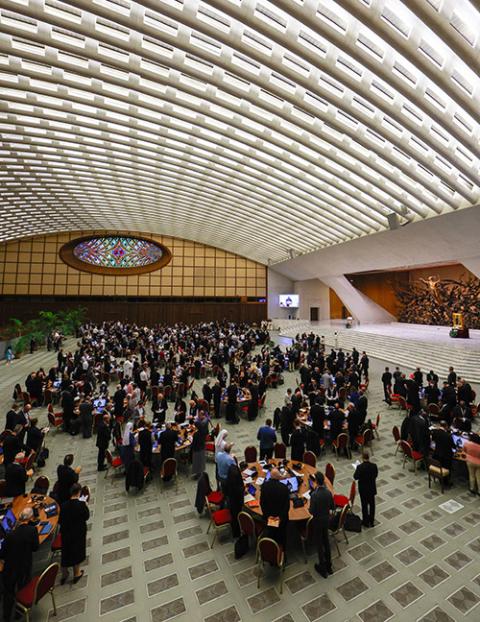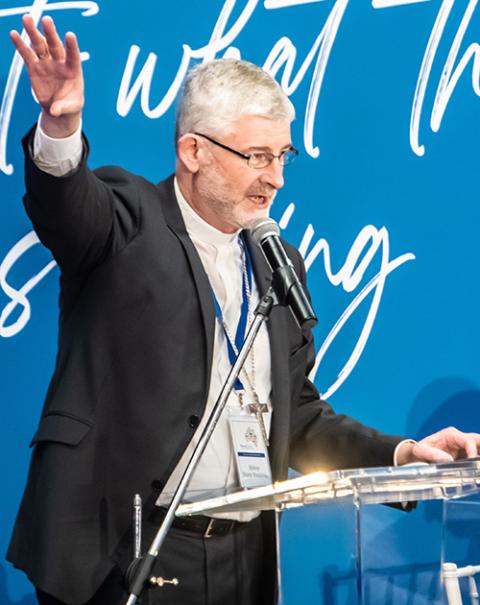Exclusive: Bishop on synod drafting committee expresses openness to women deacons
One of the 13 members of the committee expected to draft the hotly anticipated final document from Pope Francis' ongoing Vatican summit on the future of the Catholic Church has expressed an openness to ordaining women as Catholic deacons.
In an exclusive interview with National Catholic Reporter, Australian Bishop Shane Mackinlay, elected to the committee role by his peers at the Oct. 4-29 Synod of Bishops, said of discussions about women's ordination: "I'm glad that it is being addressed."
Noting that the possibility of ordaining women as Catholic deacons is mentioned in the synod's working document, Mackinlay said the issue was included "because there was such a wide representation" of people who brought it up during the two-year consultative process ahead of the Vatican assembly.
"I'm glad it's here. I'm glad it's going to be discussed," said the bishop. "And if it were to be that the outcome was for ordination to the diaconate to be open to women, I'd certainly welcome that."
Mackinlay, who has led the Diocese of Sandhurst, Australia, since 2019, spoke in an Oct. 13 interview for The Vatican Briefing, a new podcast from NCR. The podcast, which features Vatican experts Joshua J. McElwee and Christopher White, is being released weekly during the monthlong synod. It is available on Apple Podcasts, Spotify, or however you listen to podcasts.
Mackinlay's interview for The Vatican Briefing, which also focused on the synod's emotional debates about LGBTQ Catholics and how the assembly is handling tensions between members. Mackinlay, who was vice president of Australia's fifth Plenary Council, also spoke about lessons he drew from that experience.
McElwee: We know that there are still some regulations in place about how synod members can speak in public about the discussions in the assembly hall, but we've also been told in press briefings in recent days that some of the discussions have focused on how the church can better include LGBTQ Catholics. Is there anything you can tell us about what those discussions have been like, or the atmosphere of the room?
Mackinlay: I've kept an eye on what they're comfortable in talking about at the briefings, and I think they've pitched that well in terms of talking generally around the issues rather than talking specifically about what anybody's saying.
Certainly, there was, as you'd anticipate, very clear reaffirmation of the importance of the church's doctrine and teachings. But there were also great insights into personal experience and personal encounter and the journey of conversion that some members had undertaken — affirming just how critical that personal encounter, pastoral care and genuine Christian response to individuals is. And, certainly, that was very, very warmly received by the assembly.
White: We were struck on Monday [Oct. 9] during the opening session, by Dominican Fr. Timothy Radcliffe's reflections and also Luxembourg Cardinal Jean-Claude Hollerich's exhortation to members to sort of lean into the tensions in the room and not be afraid of them. How did you receive that, that it's okay to lean into the tensions?
Cardinal Hollerich has been outstanding and Fr. Timothy Radcliffe was an inspired choice, both for leading the retreat and for his contributions through this week. I know a lot of people have been tuning into their reflections and finding them enormously valuable.
We're very clear about the importance of people speaking freely, and the facilitators in our groups have come back to this a number of times. So, it's part of the direction that they're being given: We're not seeking unanimity or uniformity.
What we're seeking at this point, particularly in this first assembly and in the methodology of "conversations in the Spirit" is that there is space for everyone to be heard. For everyone to be heard, both in terms of the people in the room but also that each of us should be very mindful of the context that we come from and the conversations that we've been part of leading up to this.

Members of the assembly of the Synod of Bishops pray with Pope Francis before a working session in the Vatican's Paul VI Audience Hall Oct. 16. (CNS/Lola Gomez)
The goal of the groups is not to resolve those tensions, but to name them, to make sure that everyone is heard in a respectful and open way. Certainly, that's been my experience and what I've heard of in other groups, too.
What we're asked to vote on, and it is a formal vote at the end of each module in our groups, is not whether we agree with everything that's said in the report, but whether the report is an accurate presentation of the discussion of the group.
I haven't looked at all of the reports, but I haven't seen one report yet where it hasn't been approved unanimously. And, certainly, there's no accounts of groups not being able to both have that open discussion, and sometimes quite difficult discussion.
I'm confident that document that we're likely to have offered to us arising from this assembly will be one that does pick up all of those voices and all of those tensions. And by doing that, then give space and direction for the church's reflection throughout the world over the next 12 months.
McElwee: You were elected to the Commission for the Synthesis Report, which will help prepare the first draft of the assembly's final document. Can you describe what that group will be doing, or what will be the focus of its work?
I'd love to be able to give you that description. At this stage, I know what's in the regulations. We meet for the first time tomorrow [Saturday, Oct. 14]. And then we have longer meetings scheduled, especially in the last week.
So, just looking at the calendar and what's scheduled to be in the program for the assembly and when we're meeting as a commission, it looks like we're being asked to consider the draft report before it goes to the assembly, and then also to consider and have a role in reviewing the proposed amendments that come from the small groups before the final text comes to the assembly.
McElwee: Could you talk a bit with us about your experience at the Australian Plenary Council? During that event, it seemed like there were some tensions between some of the bishops and some of the lay delegates. I'm wondering if you can describe how that came to be resolved, and if there might be any lessons you took from that experience that you bring here with you to Rome?
In brief, yes, there were certainly tensions and that's widely known. We didn't make any secret about that.
I don't think it's accurate to describe it as a tension between bishops and other members, though. Where we encountered those tensions in a way that interrupted our proceedings was in the vote on the document around witnessing to the equal dignity of women and men, which was very contentious.
We had a consultative vote of the non-bishops and then a deliberative vote of the bishops. But in the consultative vote, one of the motions only just reached the two-thirds that were needed and the other motion failed to reach the two-thirds that was needed.
In the deliberative vote, neither of them reached the two-thirds that was needed, and it was very clear that there was a significant divergence of views and tensions and people discontented with the document — both between bishops, between clergy, between men, between women. We suspended the proceedings and spent the rest of that day unpacking that.
It ended up with a very good document on the place of women in the church. And I think better process and better documents — stronger documents — on the remaining four topics as well. That doesn't take away the pain and the wounds that people experienced in that. The distress and the hurt, people still carry that.
But it was certainly a good and a strong outcome. I don't think that people said much different by way of content in the conversations that happened after those failed votes, but they spoke from where they were — which was really distressed at the outcome, but also at the possibility that we might end up having nothing to say about women as a Plenary Council.
It was an appalling prospect and not one that anyone wanted to contemplate. And everyone was determined to do what needed to be done, to allow us to move forward.
It really mattered to everyone and they spoke about how it mattered, and listened in a different way. The outcome was, substantially, it was a better document. It was a tighter document. It certainly wasn't a watered-down document.
White: You talk about the need for the Plenary Council to have something important to say on the role of women. From your experience in these past two weeks here in Rome, how have you personally seen and felt the presence of laypeople, and especially women, contributing to this synod assembly?
In one sense, it's totally unremarkable because it's just what you would expect — what I'd be used to. We have a range of women in our midst. They're participating fully. They're speaking openly. They're making very substantive contributions, both as members and as experts. And we're gaining enormously from that.
Now, in the context of other synod approaches, I know that hasn't been the experience. But clearly, they are a very clear and very valuable presence here.
McElwee: Digging into that question, we know that the discussions at the synod over the next week will focus on the working document section that deals with women's ministry in the church, or even the possibility that women could serve in new roles or as ordained deacons, as the document specifically highlights. Do you have any particular hopes for the discussions in this regard in the coming week?
I think we can certainly anticipate that we're going to hear clear discussion of all the range of options there.
The reason that women's ordination to the diaconate is being mentioned in the instrumentum laboris is because there was such a wide representation asking that question in the two-year consultation process.
I'm glad it's here. I'm glad it's going to be discussed. I think it needs to be discussed at the universal level. One of the things that the assembly has been asked to do is to identify which areas we might be better to move on appropriately at local levels rather than universally.
The question of the ordination of women is clearly something that needs to be addressed universally. And that was the request of the Plenary Council in Australia. So, I'm glad that it is being addressed at that level. And if it were to be that the outcome was for ordination to the diaconate to be open to women, I'd certainly welcome that.


No comments:
Post a Comment